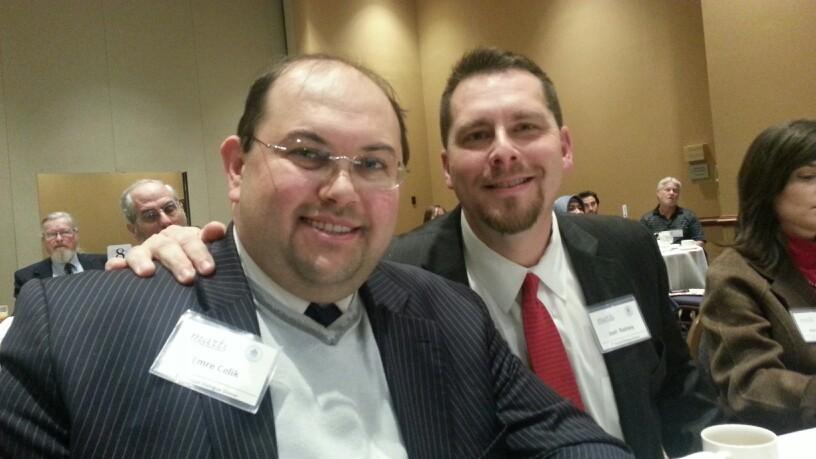,Thanks to my friend Adam Feldman for publishing this post Monday on his blog.
Our family keeps a rather large collection of Christmas movies in the house, all of which come out at this time of year. From classics like Rudolph the Rednosed Reindeer and A Charlie Brown Christmas to my personal favorite A Christmas Story, even our Christmas tree reflects the season better when next to one of these flicks projected on the flat screen TV that hangs on the wall next to it.
A
favorite Christmas movie in the Rainey house is The Chronicles of
Narnia: The Lion, the Witch, and the Wardrobe, and at the request of our
children, we have already seen this one three times this season. Mom
and Dad are happy to oblige this request, and not just because of the family
entertainment value. By God’s grace, we have already seen our oldest
son meet Jesus, and we do all we can to constantly expose our two younger
children to the Gospel. Narnia is yet another way we can
introduce spiritual themes into our children’s lives.
In fact, each time I think about the true meaning behind the metaphor, I find myself quite emotional. Yet this Christmas season, one line taken from the book struck me as particularly profound. And as I continue to ponder the true focal point of this season, I understand the tragedy of living a life reflected by the setting described by the faun Mr. Tumnus, in which it is "always winter, but never Christmas."
Of course, the tale is fictional, but C.S. Lewis intended his allegory to be exactly that from the start. In fact, his goal was to be able to read the entire story to a child, and simply say to the child at the end "Aslan is Christ," resulting in the child understanding the Gospel of Jesus Christ in its fullness. Consequently, the story rightly centers around the coming of the great Lion and the fulfillment of the prophetic freeing of Narnia.
As much as we enjoyed the film, movie screens can never depict with the same depth and precision what the human imagination can conceive with a book in hand. For example, when Mr. Beaver tells of the coming of Aslan, there was no possible way for movie makers to portray the following reaction by the children:
At the name of Aslan each one of the children felt something jump in its inside. Edmund felt a sensation of mysterious horror. Peter felt suddenly brave and adventurous. Susan felt as if some delicious smell or some delightful strain of music had just floated by her. And Lucy got the feeling you have when you wake up in the morning and realize that it is the beginning of the holidays or the beginning of summer.
In this part of his masterpiece, Lewis rightly captures the juxtaposed whole of what should permeate the heart of a Christ-follower--delight and adventure, excitement and horror--such are the appropriate extreme emotions in the presence of the King of Kings!
Yet as believers approach the coming Christmas season, I fear that our emotions might in fact be the opposite of that expressed by young Lucy. Rather than feeling the holidays have begun because of the name of Christ, we feel the obligatory pull to somehow recognize Christ because of the holidays. This not only puts the "cart before the horse," it dishonors Him who is to be adored above all things, and that at all times, not just at Christmas.
The lack of awe that many professing Christians have for the sovereign Christ is a year-round phenomenon, but is amplified at this time of year, as so many seem more impressed with the lights at Rockefeller Center than with the Light of the World--more fearful of the prospect of stolen gifts than of the reality of the Incarnate Word. Now is certainly the time of year to remember the warning of Mr. and Mrs. Beaver. Responding to Lucy's question of whether this Lion is "safe," Mr. Beaver asserts "if there's anyone who can appear before Aslan without their knees knocking, they're either braver than most or else, just silly.”
In fact, each time I think about the true meaning behind the metaphor, I find myself quite emotional. Yet this Christmas season, one line taken from the book struck me as particularly profound. And as I continue to ponder the true focal point of this season, I understand the tragedy of living a life reflected by the setting described by the faun Mr. Tumnus, in which it is "always winter, but never Christmas."
Of course, the tale is fictional, but C.S. Lewis intended his allegory to be exactly that from the start. In fact, his goal was to be able to read the entire story to a child, and simply say to the child at the end "Aslan is Christ," resulting in the child understanding the Gospel of Jesus Christ in its fullness. Consequently, the story rightly centers around the coming of the great Lion and the fulfillment of the prophetic freeing of Narnia.
As much as we enjoyed the film, movie screens can never depict with the same depth and precision what the human imagination can conceive with a book in hand. For example, when Mr. Beaver tells of the coming of Aslan, there was no possible way for movie makers to portray the following reaction by the children:
At the name of Aslan each one of the children felt something jump in its inside. Edmund felt a sensation of mysterious horror. Peter felt suddenly brave and adventurous. Susan felt as if some delicious smell or some delightful strain of music had just floated by her. And Lucy got the feeling you have when you wake up in the morning and realize that it is the beginning of the holidays or the beginning of summer.
In this part of his masterpiece, Lewis rightly captures the juxtaposed whole of what should permeate the heart of a Christ-follower--delight and adventure, excitement and horror--such are the appropriate extreme emotions in the presence of the King of Kings!
Yet as believers approach the coming Christmas season, I fear that our emotions might in fact be the opposite of that expressed by young Lucy. Rather than feeling the holidays have begun because of the name of Christ, we feel the obligatory pull to somehow recognize Christ because of the holidays. This not only puts the "cart before the horse," it dishonors Him who is to be adored above all things, and that at all times, not just at Christmas.
The lack of awe that many professing Christians have for the sovereign Christ is a year-round phenomenon, but is amplified at this time of year, as so many seem more impressed with the lights at Rockefeller Center than with the Light of the World--more fearful of the prospect of stolen gifts than of the reality of the Incarnate Word. Now is certainly the time of year to remember the warning of Mr. and Mrs. Beaver. Responding to Lucy's question of whether this Lion is "safe," Mr. Beaver asserts "if there's anyone who can appear before Aslan without their knees knocking, they're either braver than most or else, just silly.”
Both
book and movie also make clear that Christmas is inaugurated by the coming of
Aslan, and until his coming, the White Witch has cast a spell over all of
Narnia, so that it is "always winter, but never Christmas." Sounds like a familiar context.
When Santa Claus gets more attention than our Sovereign God, that isn't Christmas, just winter!
When families merely tip their hats toward the Bethlehem manger on their way to open gifts and commit gluttony, never again to pick up a Bible and reflect deeply on how God Incarnate fulfills every redemptive promise that assures me of an eternity in His presence, that isn't Christmas, just winter!
Christmas is because Jesus is! In Narnia, Father Christmas makes his appearance in this fantasyland only after it is announced by the Beavers that "Aslan is on the move." Without the coming Son of God, there is nothing to celebrate. Conversely, because He has come, there is much to celebrate!
When Santa Claus gets more attention than our Sovereign God, that isn't Christmas, just winter!
When families merely tip their hats toward the Bethlehem manger on their way to open gifts and commit gluttony, never again to pick up a Bible and reflect deeply on how God Incarnate fulfills every redemptive promise that assures me of an eternity in His presence, that isn't Christmas, just winter!
Christmas is because Jesus is! In Narnia, Father Christmas makes his appearance in this fantasyland only after it is announced by the Beavers that "Aslan is on the move." Without the coming Son of God, there is nothing to celebrate. Conversely, because He has come, there is much to celebrate!
Stand
at the manger. Meditate, as did Simeon, on the identity of this child. Tremble
with fear at the One who is infinitely more than a baby. Remember with
trepidation the words of Mr. Tumnus that "he isn't a tame lion."
Moreover, remember that He isn't a baby anymore, but that Christmas, in
remembering His first coming, be reminded of His promise to come again.
And in doing this, let your heart feel brave and adventurous. Let your soul delight in the sweetness of His presence that Scripture tells us is the fullness of a joy that cannot be duplicated by even the most tight-knit family. Most of all, let your excitement over the coming holiday be fueled by the salvific miracle of the incarnation. And know that the holidays have truly begun, not because of parties, gifts, or even the presence of family . . . .
. . . .but because "Aslan is on the move!"
And in doing this, let your heart feel brave and adventurous. Let your soul delight in the sweetness of His presence that Scripture tells us is the fullness of a joy that cannot be duplicated by even the most tight-knit family. Most of all, let your excitement over the coming holiday be fueled by the salvific miracle of the incarnation. And know that the holidays have truly begun, not because of parties, gifts, or even the presence of family . . . .
. . . .but because "Aslan is on the move!"
Merry Christmas!








